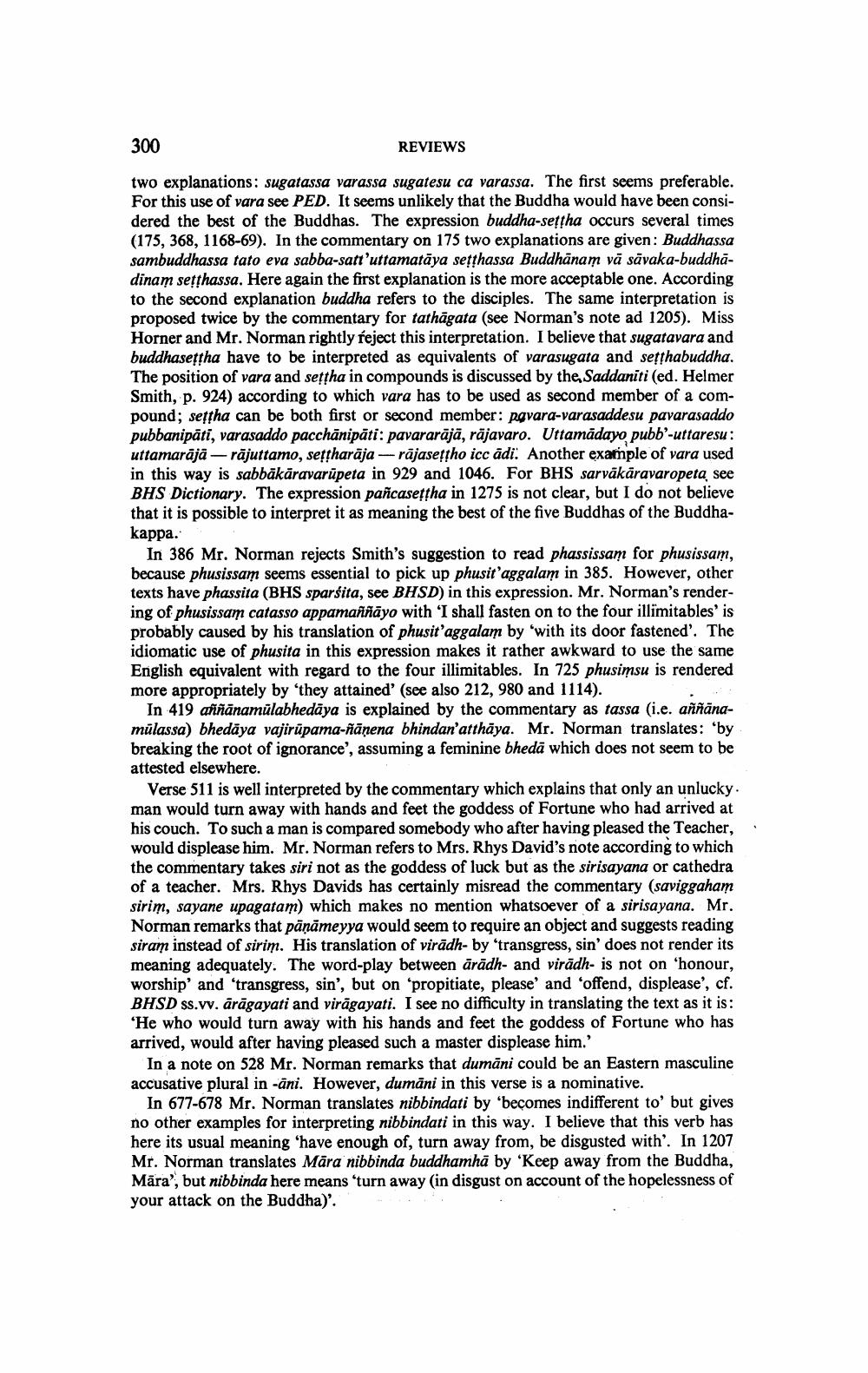Book Title: Reviews Of Different Books Author(s): Publisher: View full book textPage 4
________________ 300 REVIEWS two explanations: sugatassa varassa sugatesu ca varassa. The first seems preferable. For this use of vara see PED. It seems unlikely that the Buddha would have been considered the best of the Buddhas. The expression buddha-settha occurs several times (175, 368, 1168-69). In the commentary on 175 two explanations are given: Buddhassa sambuddhassa tato eva sabba-sattouttamataya setthassa Buddhanam va savaka-buddhadinam setthassa. Here again the first explanation is the more acceptable one. According to the second explanation buddha refers to the disciples. The same interpretation is proposed twice by the commentary for tathagata (see Norman's note ad 1205). Miss Horner and Mr. Norman rightly reject this interpretation. I believe that sugatavara and buddhasetha have to be interpreted as equivalents of varasugata and setphabuddha. The position of vara and settha in compounds is discussed by the Saddaniti (ed. Helmer Smith, p. 924) according to which vara has to be used as second member of a compound; setpha can be both first or second member: pavara-varasaddesu pavarasaddo pubbanipati, varasaddo pacchanipati: pavararaja, rajavaro. Uttamadayo pubb-uttaresu: uttamaraja -- rajuttamo, setpharaja - rajasettho icc adi. Another example of vara used in this way is sabbakaravarupeta in 929 and 1046. For BHS sarvakaravaropeta see BHS Dictionary. The expression pancasetta in 1275 is not clear, but I do not believe that it is possible to interpret it as meaning the best of the five Buddhas of the Buddhakappa. In 386 Mr. Norman rejects Smith's suggestion to read phassissam for phusissam, because phusissam seems essential to pick up phusit'aggalam in 385. However, other texts have phassita (BHS sparsita, see BHSD) in this expression. Mr. Norman's rendering of phusissam catasso appamannayo with 'I shall fasten on to the four illimitables' is probably caused by his translation of phusit'aggalam by 'with its door fastened'. The idiomatic use of phusita in this expression makes it rather awkward to use the same English equivalent with regard to the four illimitables. In 725 phusinsu is rendered more appropriately by 'they attained' (see also 212, 980 and 1114). In 419 annanamulabhedaya is explained by the commentary as tassa (i.e. annanamulassa) bhedaya vajirupama-nanena bhindan'atthaya. Mr. Norman translates: 'bybreaking the root of ignorance', assuming a feminine bheda which does not seem to be attested elsewhere. Verse 511 is well interpreted by the commentary which explains that only an unlucky. man would turn away with hands and feet the goddess of Fortune who had arrived at his couch. To such a man is compared somebody who after having pleased the Teacher, would displease him. Mr. Norman refers to Mrs. Rhys David's note according to which the commentary takes siri not as the goddess of luck but as the sirisayana or cathedra of a teacher. Mrs. Rhys Davids has certainly misread the commentary (saviggaham sirim, sayane upagatam) which makes no mention whatsoever of a sirisayana. Mr. Norman remarks that panameyya would seem to require an object and suggests reading siram instead of sirim. His translation of viradh- by 'transgress, sin' does not render its meaning adequately. The word-play between aradh- and viradh- is not on 'honour, worship' and 'transgress, sin', but on 'propitiate, please' and 'offend, displease', cf. BHSD ss.w. aragayati and viragayati. I see no difficulty in translating the text as it is: "He who would turn away with his hands and feet the goddess of Fortune who has arrived, would after having pleased such a master displease him.' In a note on 528 Mr. Norman remarks that dumani could be an Eastern masculine accusative plural in -ani. However, dumani in this verse is a nominative. In 677-678 Mr. Norman translates nibbindati by 'becomes indifferent to' but gives no other examples for interpreting nibbindati in this way. I believe that this verb has here its usual meaning "have enough of, turn away from, be disgusted with'. In 1207 Mr. Norman translates Mara nibbinda buddhamha by 'Keep away from the Buddha, Mara', but nibbinda here means 'turn away (in disgust on account of the hopelessness of your attack on the Buddha)'.Page Navigation
1 2 3 4 5 6 7 8 9 10 11 12 13 14 15 16 17 18 19 20 21 22 23
